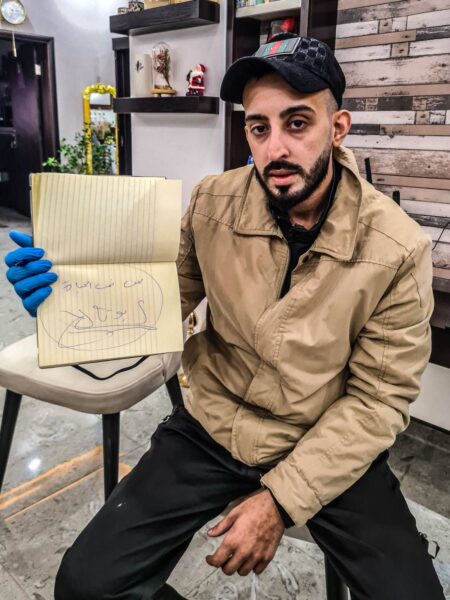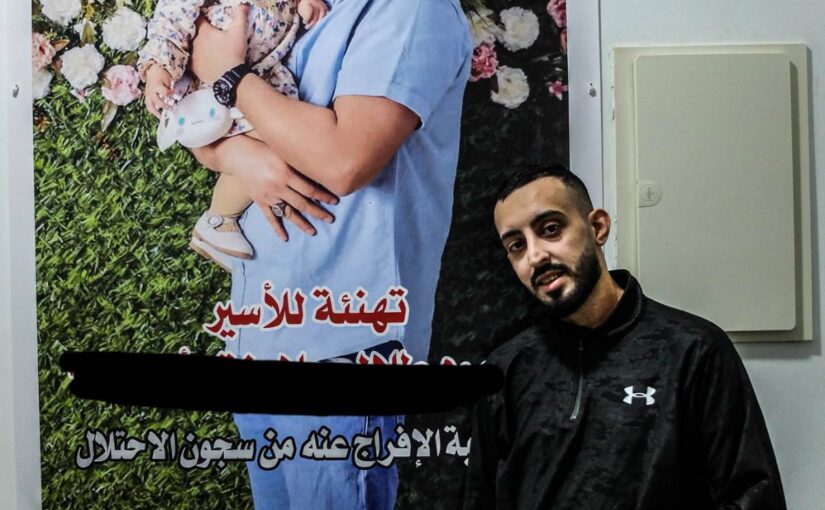His face is hollowed out, white skin pulled over prominent cheekbones. The eyes, tired but wide open, never stop. Abed just got out of Al-Naqab prison in southern Israel five days ago. He still can’t believe it.
 “I lost 60 kilos in less than a year.” He shows a giant picture of himself hanging in the lobby: a fleshy, muscular man, smiling with a small child in his arms. “That’s my daughter, that’s me. It’s been a year.” The man in front of me looks like the specter of the hanging image. Even the little girl zomping behind us doesn’t seem to recognize him: when her father calls her name, she throws herself into her cousin’s arms, almost frightened. “My daughter when she first saw me was hiding, calling me uncle. It was so sad.”
“I lost 60 kilos in less than a year.” He shows a giant picture of himself hanging in the lobby: a fleshy, muscular man, smiling with a small child in his arms. “That’s my daughter, that’s me. It’s been a year.” The man in front of me looks like the specter of the hanging image. Even the little girl zomping behind us doesn’t seem to recognize him: when her father calls her name, she throws herself into her cousin’s arms, almost frightened. “My daughter when she first saw me was hiding, calling me uncle. It was so sad.”

Abed’s message to the world
Abed is 28 years old and was a baker by trade. They arrested him last December in a night raid where the Israeli military stormed his home by breaking down his door, smashing several pieces of furniture and windows. And they took him away. He would never hear from his family or have any contact with the outside world again until November 30, 2024.
We are at his home in the refugee camp in Jenin, perhaps the city most affected by Israeli attacks in the West Bank over the past year. To get there, one has to travel several roads flooded with mud and water, with a panoramic view of piles of debris and damaged or demolished houses. Indeed, the destruction by Tel Aviv’s D9s and bulldozers has spared no infrastructure in the camp, which is considered by Israel to be one of the strongholds of resistance in the West Bank: every road, as well as the water and electricity systems, have been systematically and methodically devastated.
“They arrested me only because I am Palestinian,” begins the account of Abed, who is at pains to emphasize that he was not linked to any party and was not part of the resistance. “The conditions under which they kept us were terrible. I don’t know if I will be able to talk about what I experienced… even animals are not kept like that.” But then, he is a river of words.
“They gave me shampoo six times in a year,” he recounts. “We could shower, but they wouldn’t give us anything to wash with.” Before October 7, life for Palestinians in prison was different. Then the detainees suffered Israel’s revenge on their skin. “We became numbers. They called us by number all the time.” He shows us, it was written in marker on his ID card. It must have been seven to eight digits; reading it feels like going back to moments in history that one hoped had been surpassed. “The first day they gave me a plastic plate, spoon and fork, the disposable kind. I had to use it for a year.” He smiles. “It’s crazy, but when I went out, I wanted to take them with me. I don’t know how to use the real ones anymore.”
There were 14 of them living in a cell that was made for nine people. They slept without mattresses, in beds as hard as stones or on the floor, cramped together to keep warm. “We didn’t have enough clothes, and they didn’t give us anything to cover ourselves. People would make socks by cutting pieces from the blankets.” Abed continued, “When they brought us food, it was not enough for human beings. It was not enough to survive… I lost 60 kg, but if my situation in prison was not so good, the condition of many others was worse.”
News from outside the prison came only when new inmates arrived. There was no contact with the outside world. “Since October 7, they took everything away: no TV, no books, no newspapers, no visits, no letters to family members, no contact with the lawyer.” Not even the hearings were an opportunity to meet the lawyer, or a friendly face. “There was no real court, it was a room, they moved everything online.” He adds: “Every time they moved us from the cell to that room, or somewhere else, we knew we would not come back healthy.” Beatings were the norm, and they could also come during the many searches or counts they did of inmates in cells.
“I have scabies. Almost everyone in prison has scabies, at least 90 percent… I had it all over my body… it was not normal. They didn’t give us medicine. It was torture.” He then talks about a weird episode. “Once they finally sent me to the ‘doctor’ – in prison there was no hospital, and anyway they didn’t give you anything… there was a group of people who were not Israelis, they were international. I asked one of these ‘doctors’ where he was from, he told me [he was] French; he didn’t help me. Sometimes I think they were doing tests on us, like we were animals.”
He repeats several times, “I just want to be considered a human being, it doesn’t matter that I am Palestinian, I am a human being.”
He shows us video of when he was released from prison a few days ago. When he was released, he was greeted by a crowd of his family and friends, where he hugged his mother and he cried. “For a year, I never cried. But as soon as I saw my mother, I cried,” he recounts. “My mother was sick. I could never write to her. But whenever I had a chance to see the moon from my cell, I sent her a message through the moon…”
At least 47 inmates have died in Israeli prisons since Oct. 7 due to torture or lack of treatment by Israel. I ask him if he has witnessed such incidents. He seethes. “One of these 47 was in my cell,” he says. “They brought him, who was already beaten to a pulp; he was injured. They had moved him there. Then they beat him again. At night they came in and counted us, they did that a lot. It was winter, it was cold. He was still lying on the ground, because he was sick, he couldn’t get up. I remember seeing blood coming out of his chest, I think he had internal bleeding but also external bleeding, he was bleeding. The police picked him up and carried him out of the cell, I could see him. They left him there in the open for hours and hours. It took him six hours to die. In front of my eyes.” They wanted to kill him, he says between the lines. He was politicized, from the Hamas party. He would not give his name.
He is afraid; he does not want to go back to prison. “I never want to live that condition of life again,” he says. The state of Israel in fact does not forget. Abed points us to Karim, a young boy of perhaps 15 who has been sitting by his side since the start of the chat. “Every time they raid here in the camp, the military enters his house and beats his whole family. This is because a member of his family in the past had relations with the resistance… Even though he is dead, they continue to take revenge and punish the whole family. They beat everyone.”
“Even if we believe in peace, where is the peace? I want peace. Israel does not want peace.”
He asks if he can leave a message for the rest of the world. He takes my notebook and writes in large Arabic characters, underlining the wording several times:
ALL PALESTINIANS LOVE LIFE.
- radio time
- Log in to post comments

